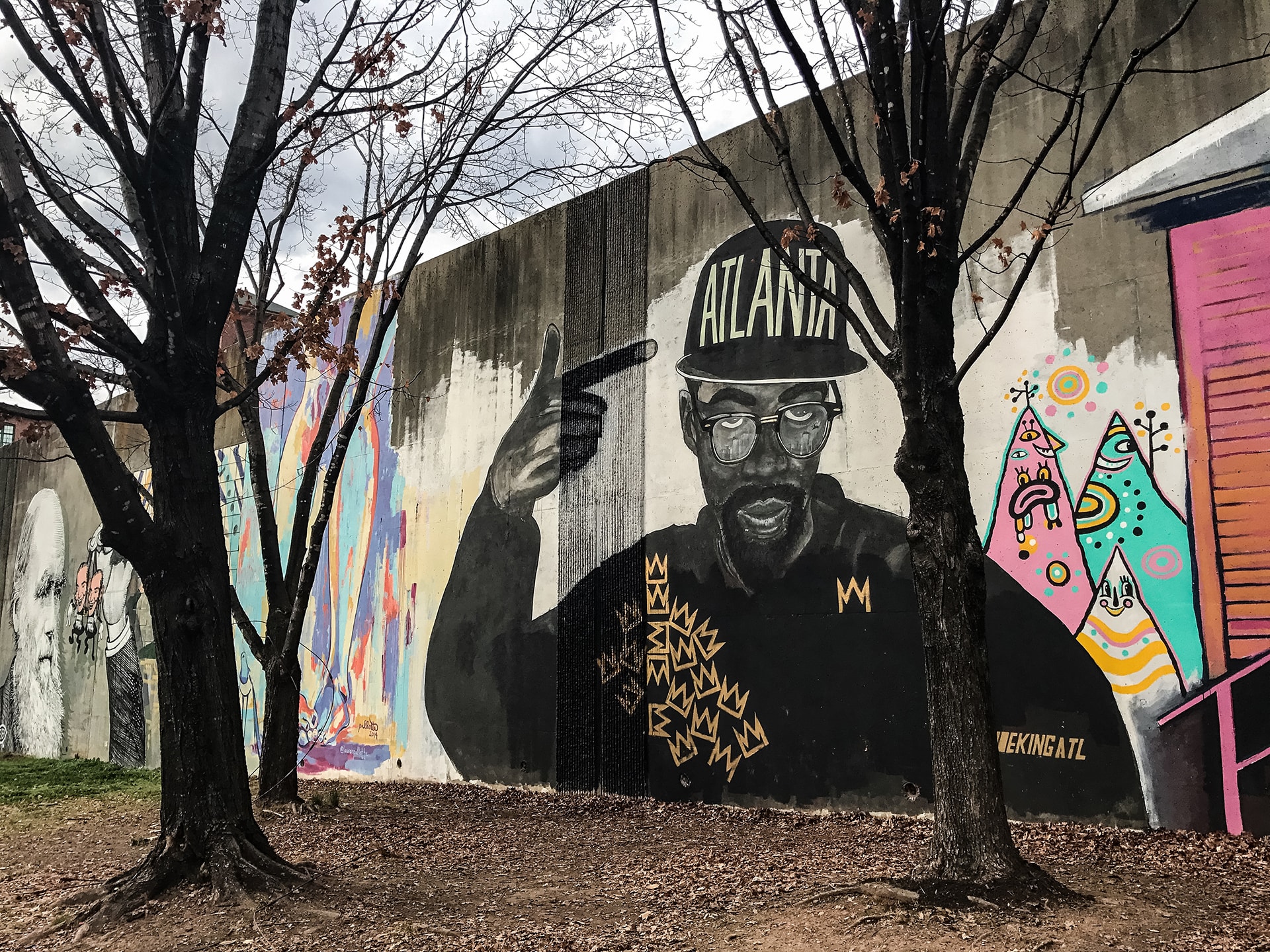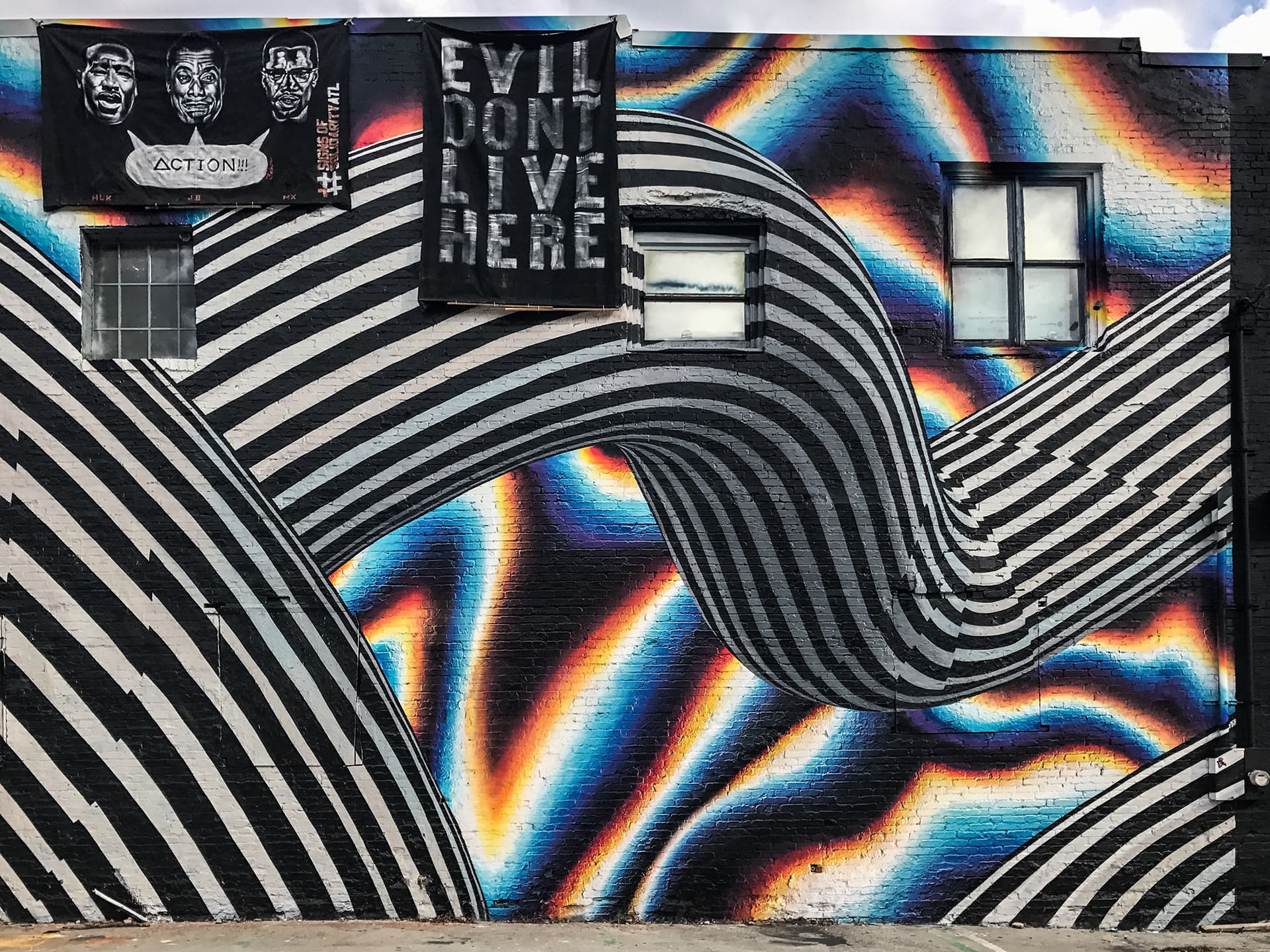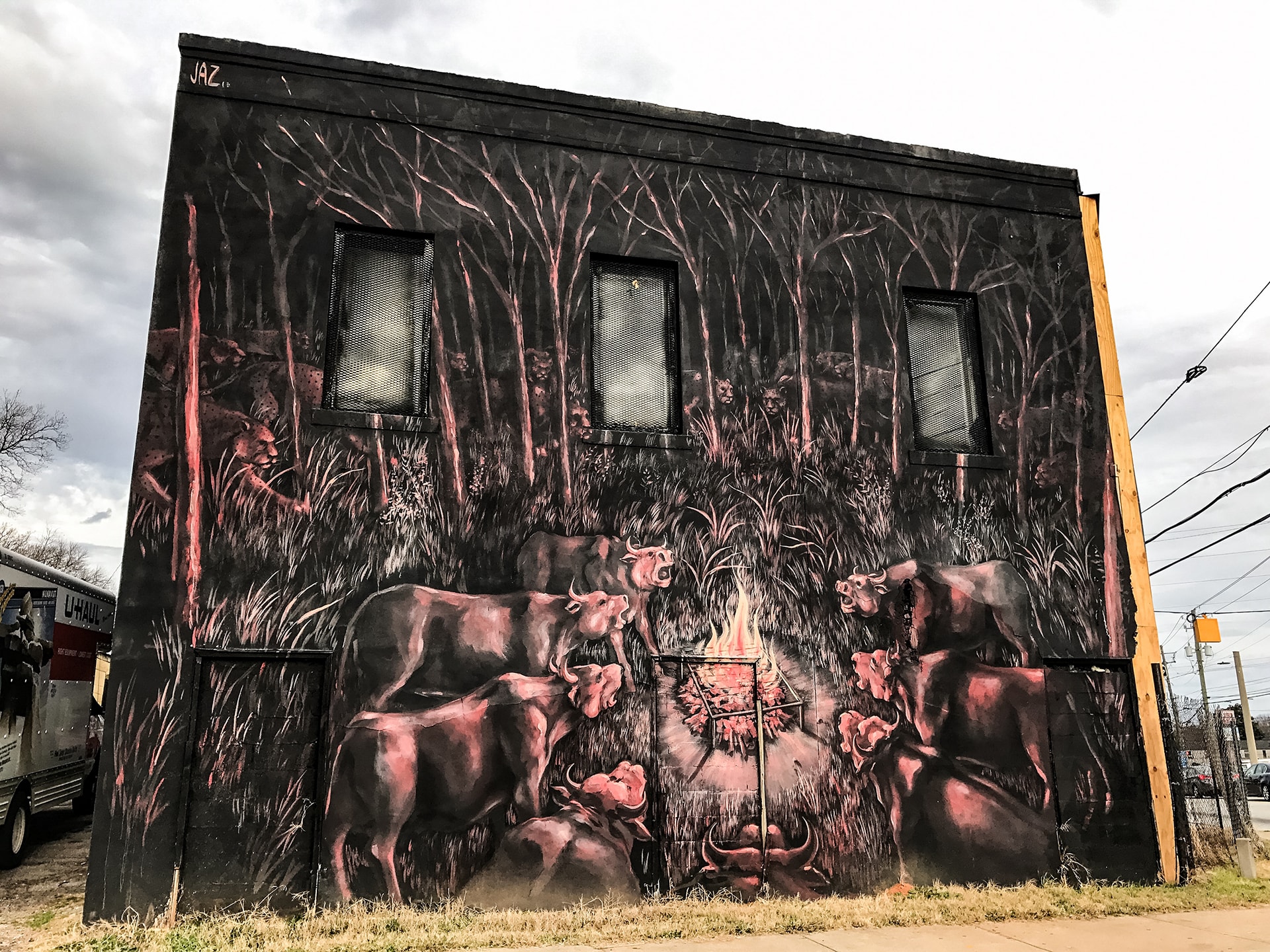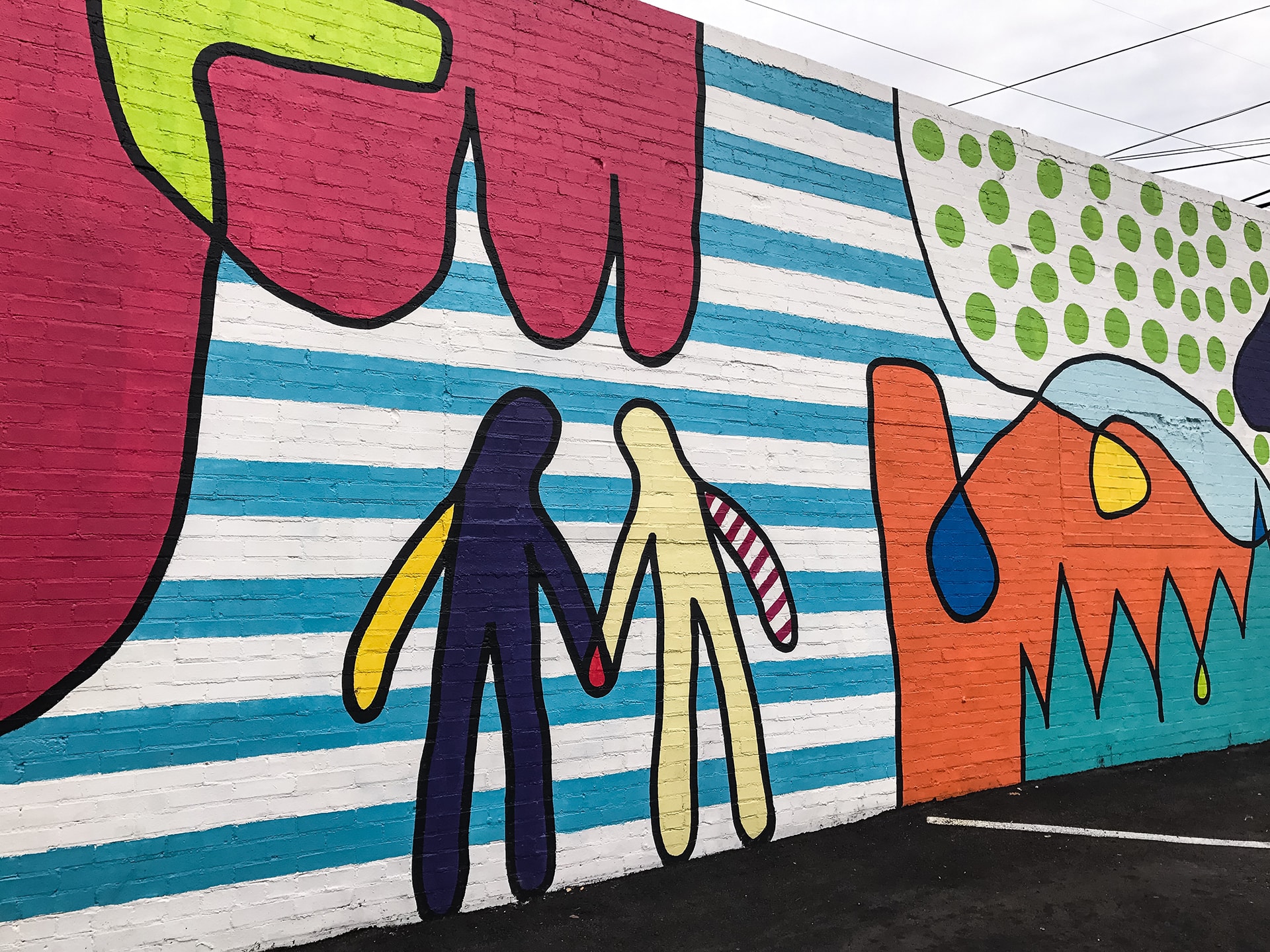Two Saturdays ago, a national tweetstorm erupted in Georgia’s fifth congressional district. Y’all already know that story. Here at The Bitter Southerner, we believe that to know a place, you must know its people. We took a photographic and conversational tour of the Fifth on the Sunday after the eruption. This is what we saw and heard.
Words and Photographs by Stephanie Calabrese
I fell in love with Atlanta the moment I first drove down Peachtree Road in 1987, and I’ve followed its extensive growth through living, working and exploring this city over the course of 30 years.
Two Fridays ago, U.S. Rep. John Lewis, the Civil Rights Movement leader whose district encompasses three-quarters of Atlanta, announced he would not attend the presidential inauguration. The next day, a proud Southern city found itself suddenly labeled on Twitter as in “horrible shape and falling apart,” not to mention “crime-infested.”
That was not an accurate portrayal of the Atlanta I know. Not the city that is home to the Atlanta BeltLine, an innovative, globally praised project that is making the entire city more attractive and friendly to pedestrians. Not the Atlanta where richly diverse groups of neighbors gather on their porches and stoops. Not the city I love.
So, the next day — Sunday, January 15 — I reached out to some friends in Rep. Lewis’ Fifth District. And friends of friends. And tapped on the shoulders of strangers. Over the course of eight hours, I drove throughout the district and sat down with 11 folks for impromptu conversations on their front porches.
Here’s what I saw and what they said about life in the Fifth.
Madeline fell in love with Kirkwood and moved back to Atlanta, drawn by its culture and diversity, seven months ago, after living many years in a rural town about an hour east of Atlanta. “Here, I see black families and white families on the street together, and that just didn’t happen out in the country. There’s a strong sense of community here.”
It had been 20 years since Madeline last lived in the city. “The challenge now is to keep the people who established these neighborhoods, while inviting other people to come in and join that culture,” she says. “And I think that’s possible. What the BeltLine has done for Atlanta is amazing. It’s gotten people out of their cars and walking and biking and connecting beyond their neighborhood. And that’s changing Atlanta in a beautiful way.”
Susan fled the suburbs and moved downtown 24 years ago. “I actually feel safer downtown than I ever did in my suburban house. I know my neighbors. We meet for coffee. I walked to a bar last night to watch the Falcons game, and there were 20 of my neighbors there because somebody sent out an email. I didn’t see that when I lived out in the suburbs. Downtown Atlanta is walkable. It’s Uber-able. There’s always something going on, from bike rides to art strolls. It’s a place to live, not a place to go into your house and curl up.”
James has lived in the Capital View neighborhood, a historical community named for its excellent view of the Georgia State Capitol building, for nearly five years. Capitol View later this year will become accessible to pedestrians on the BeltLine, which will connect this community to the Atlanta Falcons' new Mercedes-Benz Stadium. James invested in this neighborhood because it’s affordable, only a bike ride away from downtown, a quick drive to Hartsfield-Jackson International Airport, and because he loved the two pecan trees in the backyard.
“I think it’s foolish for anyone to make an assumption about any city without living there. They don’t know. They have no context. Atlanta is a great town. It’s a diverse city going through a lot of changes. We have always had a lot of pride around the work we do here. A hundred million people [a year] come through our airport safely. That’s a big deal. We’re becoming the film and entertainment hub of the world.”
Edward moved his family to the Capitol View Manor neighborhood in southwest Atlanta 13 years ago because of its great architecture and cultural diversity.
“We’ve got older people, younger people, black people, white people, highly educated professional people, entrepreneurs, day-laborers, architects, and we all live on this one street. This is a great source of pride for me when I turn down my street. For 20 years, I’ve lived in Congressman John Lewis’ district, and I’ve seen it always improving. We still have our problems, but I would invite President Trump to come see our neighborhood and our community and be a part of it before he judges us. Now that we’re all trying to come together, I hope he can come down and see what we’re about instead of judging us from afar. I invite him to come have dinner with me.”
Newcomers to the Fifth District, Jeanna and her husband recently bought and renovated a 1938 home in the Peachtree Heights West neighborhood. They liked the history, charm and quirkiness of the house.
“It’s very centrally located to the all of the things we like to do. I love the art scene. We love sports – cheering on the Falcons. We like being right here in the middle of everything.”
That week, her son, Harrison, was introduced by his public-school kindergarten teacher to stories about the Rev. Martin Luther King Jr., and came home curious to know more. This led to a quick drive to the The King Center on Auburn Avenue to learn more.
“There may be crime, but there’s crime in a lot of big cities. There’s just something special about the South. It’s really friendly. There’s a lot of culture here.”
Randy has lived in the Adair Park neighborhood for six years. Atlanta has always been his home. In 2011, he left active duty in the U.S. Air Force and enrolled at Georgia Tech. He wanted to live close to downtown in a community that would be affordable.
“Since then, I’ve really fallen in love with the people. People make this place special. I’m proud to be here because we care about our community – our neighbors and our geography. We’re open to helping each other. Gentrification is occurring, so our population is shifting – not only our racial demographic but also our socioeconomics. Through mutual respect and good work at the city [government] in terms of policy, we can ensure there is a place for everybody.
“The Fifth District is a community that is working toward improving and empowering ourselves. We are a positive community, and we’re looking out for each other and for those who have less. We do have issues with crime. We do have issues with illiteracy. We do have significant challenges, so that’s not to be swept under the rug or dismissed. But at the same time, it is to be addressed lovingly. It’s not just some wasteland. We care about this place, and we believe that Congressman Lewis has been working on behalf of our community to ensure we’re properly represented at the federal level so we can continue to improve.”
Alison lives in the Reynoldstown neighborhood. Alphonzo lives in Kirkwood. For the past five years, this brother and sister team have run a business in Castleberry Hill, just southwest of downtown Atlanta. They also own commercial property in the neighborhood, purchased by their family more than 30 years ago. Before coming home to Atlanta, they lived in Los Angeles, San Francisco, New York, and abroad. Today, they’re focused on attracting artistic and creative people to make a positive impact on business in the Castleberry Hill community.
“Atlanta — and especially this area — is a place where people are really striving to see something different, and people are excited to be a part of that energy,” Alison says. “It is by no means perfect, but at the same time, it’s marked by the same struggles and successes that every community across America has been marked with. There are people who are helping each other. There are some people who have moved faster than others, and those people are very willing to reach back and continue that line of people who are contributing to this city. I don’t think it’s fair to marginalize a community. I feel honored to be here.”
Hakim is a commercial real estate agent and developer, whose work focuses on the Fifth District. He bought his home in the West End three years ago. He’s been renovating it bit by bit.
“Atlanta is no different from most urban areas in America where there is a resurgence – people moving back into cities. Southwest Atlanta has gone through some blight and neglect, but it’s turning around. The bones and infrastructure of this area is so amazing. We’ve got mass transit, a highway system, parks. I love the West End; it’s the Harlem of Atlanta. I like the affordability, but what I really love is the sense of community. We feel responsible for each other. In Atlanta, the sense of ownership is very different than other places. I’ve lived in D.C., New Jersey, and New York, and I think the ability for people to own their property gives them a sense of responsibility and accountability, and inspires them to add value to their neighborhood.”
Timo has lived here in East Atlanta for 17 years, and Meg moved in 12 years ago when they were married. She grew up in a homogenous community in suburban South Carolina, but Meg appreciates and loves the diversity of Gresham Park.
“The people we’ve met are irreplaceable. The diversity has been the most informative, and it’s really what has helped us grow as humans,” Meg says. “We live in an incredibly populous district. Of course, there are problems. There are struggles in all cities. But we’re not touched by crime on a daily basis. We’re not cowering in fear. We’re out walking the dog. We’re talking to our neighbors. We live a pretty good life over here. And it’s nice to see so many people galvanized around their passion for this city.”
Timo adds: “John Lewis is an amazing man, and I’m proud every time I get a chance to vote for someone who has had so much influence on our country and our people.”
“Even if you disagree with his politics,” Meg says of Lewis, “you have to at least appreciate the level of service he has given to this country and all the struggles he’s been through.”
Seventeen years ago, Lisa and her husband moved as newlyweds into their home in the Grant Park neighborhood. Lisa is originally from California and her husband from New York. They didn’t know Atlanta well then, but liked the affordability, proximity to downtown, and the ability to walk to a park. Since then, they’ve seen dramatic growth in their neighborhood — now flourishing with restaurants and retail, and an entry point to the Atlanta BeltLine.
“The Fifth District is the heart of the Southeast! Everything comes through here,” Lisa says. “You have all of the cultural events, theater, sporting events, art exhibits. And the best part about being in Atlanta is that you can still have an impact. If you want to build something, start something. You can still be impactful to this community. It’s not saturated like a New York or a San Francisco. This city, like any city, is not without its faults. Atlanta’s symbol is the phoenix, rising from the ashes of the Civil War era. We’ve been rising since. There’s nothing about this city that is a disaster or a disgrace. It’s only been improving. And we’ve been here for the last 17 years, watching and contributing to its improvement year after year.”
Native Midwesterners Cynde and Rick moved to Gresham Park seven years ago, after many years in Decatur on the east side on Atlanta. They spend six months of the year in their Gresham Park home and the other six months of the year in Maine. They love their ability to get around the city and experience its diversity.
“What you have here is a community, and there is no regard for race or religion,” Rick says. “It is neighbors helping neighbors, and that’s the beauty of it. We have been supporters of John Lewis. At our age, we were there and part of the movement back in the ’60s. Atlanta is a great place to live. What we’ve seen — over the past 30 years we’ve been here — is people are just flooding in, and it makes traffic a little tough, but this is an excellent place to live. The amenities. The sports. The arts. The economy. The restaurants. It’s the middle of January, and we’re sitting out here in shirtsleeves! That sort of says it all.”






















